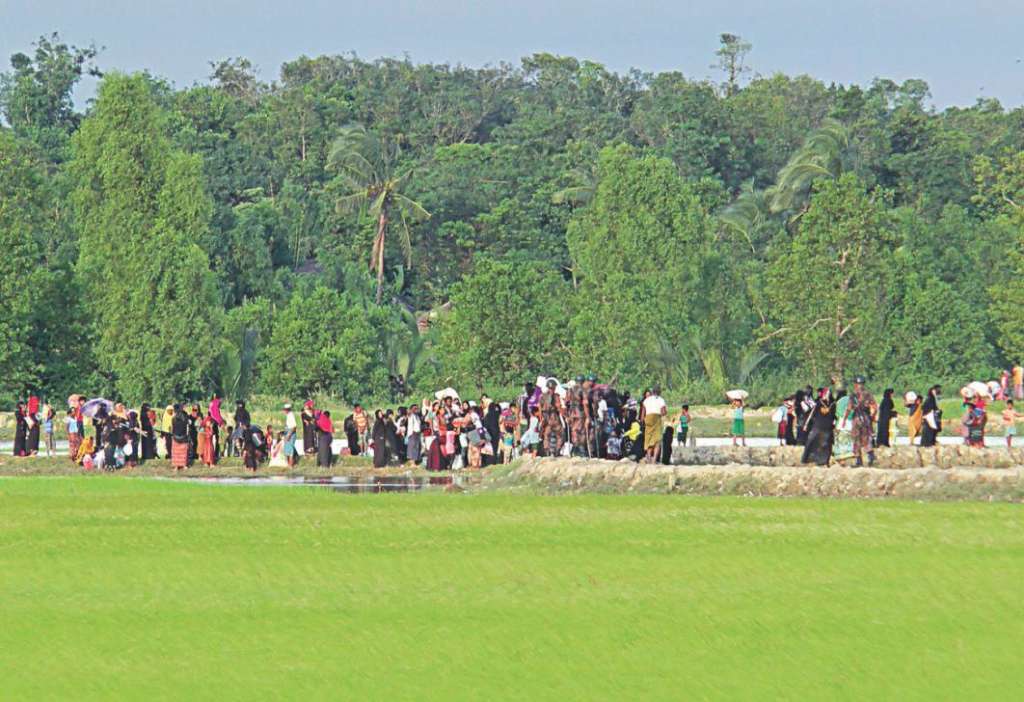Thousands of Rohingya Muslims fled Myanmar’s Rakhine state in the northwest to neighboring Bangladesh as border clashes continued on Sunday.
The government evacuated some 4,000 non-Muslim villagers in the unrest.
The death toll from the violence that erupted on Friday with coordinated attacks by Rohingya insurgents has climbed to 98. The office of Myanmar’s leader, Aung San Suu Kyi, said military and border police responded to the attacks — which left 12 security personnel and 77 Rohingya dead — by launching “clearance operations.”
Mohammad Nur, a Rohingya leader at an unregistered camp in Bangladesh’s Cox’s Bazar district, told The Associated Press by phone that he had heard that some 100,000 Rohingya had gathered along the border to try to enter Bangladesh, but the number could not be confirmed.
Accounts by pro-Rohingya social media activists are impossible to independently verify because the government bars journalists and other outsiders from entering the region without permission.
Around 2,000 people have been able to cross into Bangladesh since Friday, according to estimates by Rohingya refugees living in the makeshift camps in Bangladesh.
While the chaos and lack of access made detailed assessments difficult, experts said the latest attacks were so widespread they appeared to be more akin to a movement or an uprising, rather than an insurgent offensive.
One army source said the military was also struggling to differentiate.
The treatment of approximately 1.1 million Muslim Rohingya in mainly Buddhist Myanmar has emerged as the biggest challenge for Suu Kyi. She has condemned the raids in which insurgents wielding guns, sticks and homemade bombs assaulted 30 police stations and an army base.
The Nobel Peace Prize laureate has been accused by some Western critics of not speaking out for the long-persecuted Muslim minority.
Win Myat Aye, Myanmar’s minister for social welfare, relief and resettlement, told Reuters late on Saturday that 4,000 “ethnic villagers” who had fled their villages had been evacuated, referring to non-Muslim residents of the area.
“We are providing food to the people cooperating with the state government and local authorities,” said Win Myat Aye. He was unable to describe the government’s plans to help Rohingya civilians.
The Rohingya have for years endured apartheid-like conditions in northwestern Myanmar – they are denied citizenship and face severe restrictions on their movements. Many Myanmar Buddhists regard them as illegal immigrants from Bangladesh.
Across the border, Bangladesh’s foreign ministry said it was concerned thousands of “unarmed Myanmar nationals” were planning to enter the country.
The UN’s International Organization for Migration said recently that around 87,000 Rohingya had crossed the border and entered Bangladesh since last October, when a new string of violence broke out in Myanmar’s Rakhine state.
Suu Kyi called the attacks “a calculated attempt to undermine the efforts of those seeking to build peace and harmony in Rakhine state.”
The United States urged authorities to avoid a response that would inflame the tensions. State Department spokeswoman Heather Nauert said the attacks underscored the importance of the government implementing recommendations of a commission chaired by former UN chief Kofi Annan, which published its final report on Thursday recommending that the government act quickly to improve economic development and social justice in Rakhine state to resolve violence between Buddhists and the Rohingya.
The clashes were deadlier than an attack by the militants on three border posts last October that killed nine policemen and set off months of brutal counterinsurgency operations by Myanmar security forces against Rohingya communities in Rakhine. Human rights groups accused the army of carrying out massive human rights abuses including killing, rape and burning down more than 1,000 homes and other buildings.
The army’s abuses fueled further resentment toward the government among the Muslim Rohingya, most of whom are considered by Myanmar’s Buddhist majority to be illegal immigrants from Bangladesh and are denied citizenship and its rights.
Rohingya have been fleeing Myanmar to Bangladesh since the early 1990s and there are now around 400,000 in the country, where they are a source of tension between the two nations who both regard them as the other country’s citizens.
